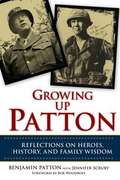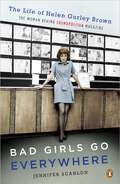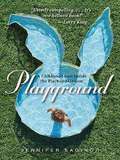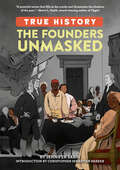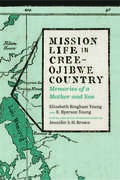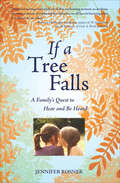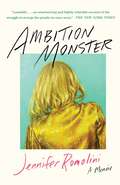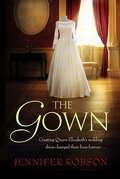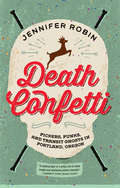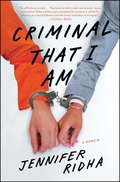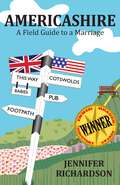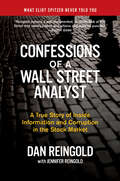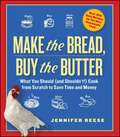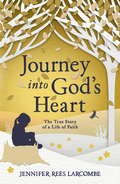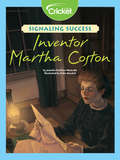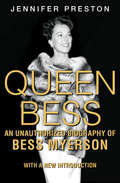- Table View
- List View
Chalked Up: My Life in Gymnastics
by Jennifer Sey<P>Fanciful dreams of gold-medal glory led Jennifer Sey to the local gymnastics club in 1976. A natural aptitude and a willingness to endure punishing hard work took her to the elite ranks by the time she was eleven years old. Jennifer traveled the country and the world competing for the U.S. National team, but the higher she set her sights--the world championships, the 1988 Olympics--the more she began to ignore her physical and mental well-being. <P>Jennifer suffered devastating injuries, developed an eating disorder, and lived far from family and friends, all for the sake of winning. When her parents and coaches lost sight of her best interests, Jennifer had no choice but to redefine her path into adulthood. She had to save herself. <P>Chalked Up delivers an unforgettable coming-of-age story that will resonate with anyone who has ever felt not good enough and has finally come to accept who they were meant to be. <P><b>A New York Times Bestseller</b>
Growing Up Patton
by Benjamin Patton Jennifer ScrubyThe grandson of the legendary World War II general George S. Patton Jr., documentary filmmaker Benjamin Patton, explores his family legacy and shares the inspirational wit and wisdom that his grandfather bestowed upon his only son and namesake. In revealing personal correspondence written between 1939 and 1945, General Patton Jr. espoused his ideals to Benjamin's father, then a cadet at West Point. Dispensing advice on duty, heroism and honor with the same candor he used ordering the Third Army across Europe, Patton shows himself to be as dynamic a parent as a military commander. Following in those famous footsteps, Benjamin's father became a respected and decorated hero of both the Korean and Vietnam wars. Ironically, as he rose to major general, he also proved himself just as brave, flamboyant, flawed and inspiring as his father had been. A study of a great American original, Growing Up Patton features some of the pivotal figures in Benjamin's father's life, including Creighton Abrams, the WWII hero who became his greatest mentor; Charley Watkins, a daredevil helicopter pilot in Vietnam; Manfred Rommel, the son of German Field Marshal Erwin Rommel; Joanne Patton, the author's mother and a resourceful fighter in her own right; and Benjamin's mentally challenged brother, George. Growing Up Patton explores how the Patton cultural legacy lives on, and in the end, reveals how knowing the history of our heritage--famous or not--can lead to a deeper understanding of ourselves. INCLUDES NEVER-BEFORE-PUBLISHED LETTERS BETWEEN GENERAL GEORGE S. PATTON AND HIS SON DURING WORLD WAR II INCLUDES NEVER-BEFORE-PUBLISHED FAMILY PHOTOGRAPHS
Bad Girls Go Everywhere: The Life of Helen Gurley Brown, the Woman Behind Cosmopolitan Magazine
by Jennifer ScanlonThe biography of the revolutionary magazine editor who created the &“Cosmo Girl&” before Sex and the City&’s Carrie Bradshaw was even bornAs the author of the iconic Sex and the Single Girl (1962) and the editor-in-chief of Cosmopolitan magazine for over three decades, Helen Gurley Brown (1922–2012) changed how women thought about sex, money, and their bodies in a way that resonates in our culture today. In Jennifer Scanlon's widely acclaimed biography, the award-winning scholar reveals Brown&’s incredible life story from her escape from her humble beginnings in the Ozarks to her eyebrow-raising exploits as a young woman in New York City, and her late-blooming career as the world's first "lipstick feminist." A mesmerizing tribute to a legend, Bad Girls Go Everywhere will appeal to everyone from Sex and the City and Mad Men fans to students of women's history and media studies.
Bonkers: My Life in Laughs
by Jennifer SaundersTHE HILARIOUS, TOUCHING LIFE STORY OF THE ICONIC COMEDIAN AND NATIONAL TREASURE 'Fabulous? Yes. Funny? Absolutely' Mail on SundayJennifer Saunders' comic creations have brought joy to millions. From Comic Strip to Comic Relief, from Bolly-swilling Edina in Ab Fab to her takes on Madonna or Mamma Mia, her characters are household names. But it's Jennifer herself who has a place in all our hearts. This is her funny, moving and frankly bonkers memoir, filled with laughter, friends and occasional heartache - but never misery. BONKERS is full of riotous adventures: accidentally enrolling on a teacher training course with a young Dawn French, bluffing her way to each BBC series, shooting Lulu, trading wild faxes with Joanna Lumley, touring India with Ruby Wax and Goldie Hawn. Prepare to chuckle, whoop, and go BONKERS.'Beautifully written and frequently hilarious' Guardian'Her account of battling breast cancer is as honest as it is uplifting' Daily Mail'Endearing and hilarious. If only all celebrity biographies were this funny' Telegraph
Playground: A Childhood Lost Inside the Playboy Mansion
by Jennifer SaginorYou are six years old. Every day after school your father takes you to a sprawling castle filled with exotic animals, bowls of candy, and half-naked women catering to your every need. You have your own room. You have new friends. You have an uncle Hef who's always there for you. Welcome to the world of Playground, the true story of a young girl who grew up inside the Playboy Mansion. By the time she was fourteen, she'd done countless drugs, had a secret affair with Hef's girlfriend, and was already losing her grip on reality. Schoolwork, family, and "ordinary people" had no meaning behind the iron gates of the Mansion, where celebrities frolicked, pool parties abounded, and her own father -- Hugh Hefner's personal physician and best friend, the man nicknamed "Dr. Feel Good" -- typically held court. Every day was a party, every night was an adventure, and through it all was a young girl falling faster and faster down the rabbit hole -- trying desperately hard not to get lost.
The Founders Unmasked (True History)
by Jennifer Sabin"Its power to spark important conversations should not be underestimated." —Booklist "A powerful series that fills in the cracks and illuminates the shadows of the past." —Sherri L. Smith, award-winning author of Flygirl "[Jennifer Sabin] does a concise, coherent job of breaking down complicated material … an important title for students and an immensely useful resource for educators." —School Library Connection "With material presented chronologically and in straightforward language (with text-embedded glossaries), brief profiles of key players, numerous quotes and sidebars, and fresh details that help readers grasp nuances and understand consequences...the conversation tone is inviting and...encourages thoughtful reflection." —Booklist Introducing a new nonfiction series for the next generation of activists, uncovering the hidden history of The United States through an anti-racist lens. The true story of the men—and women—surrounding the founding of America. In the summer of 1776, when Thomas Jefferson arrived in Philadelphia to sign the Declaration of Independence, declaring that &“all men are created equal,&” he wasn&’t alone. With him was Robert Hemings, just one of the many Black people Jefferson enslaved. But who was Robert Hemings? Discover his story and the true history of those who really helped build America. Featuring riveting interviews with historians, including Margaret Kimberley, author of Prejudential: Black America and the Presidents, The Founders Unmasked is a quest for the whole truth: the good and the bad.
Mission Life in Cree-Ojibwe Country: Memories of a Mother and Son
by Jennifer S. Brown Elizabeth Bingham Young E. Ryerson YoungIn May of 1868, Elizabeth Bingham Young and her new husband, Egerton Ryerson Young, began a long journey from Hamilton, Ontario, to the Methodist mission of Rossville. For the next eight years, Elizabeth supported her husband’s work at two mission houses, Norway House and then Berens River. Unprepared for the difficult conditions and the “eight months long” winter, and unimpressed with “eating fish twenty-one times a week,” the young Upper Canada wife rose to the challenge. In these remote outposts, she gave birth to three children, acted as a nurse and doctor, and applied both perseverance and determination to learning Cree, while also coping with poverty and short supplies within her community. Her account of mission life, as seen through the eyes of a woman, is the first of its kind to be archived and now to appear in print. Accompanying Elizabeth’s memoir, and offering a counterpoint to it, are the reminiscences of her eldest son, “Eddie.” Born at Norway House in 1869 and nursed by a Cree woman from infancy, Eddie was immersed in local Cree and Ojibwe life, culture, and language, in many ways exemplifying the process of reverse acculturation often in evidence among the children of missionaries. Like those of his mother, Eddie’s memories capture the sensory and emotional texture of mission life, providing a portrait that is startling in its immediacy. Skillfully woven together and meticulously annotated by Jennifer Brown, these two remarkable recollections of mission life are an invaluable addition to the fields of religious, missionary, and Aboriginal history. In their power to resurrect experience, they are also a fascination to read.
If a Tree Falls: A Family's Quest to Hear and Be Heard
by Jennifer RosnerA revealing memoir of a family and a &“wrenching journey into deafness from the standpoint of a mother, a wife, a daughter, a philosopher, and a Jew&” (Ilan Stavans, author of On Borrowed Words: A Memoir of Language). When her daughters were born deaf, Jennifer Rosner was stunned. Then she discovered a hidden history of deafness in her family, going back generations to the Jewish enclaves of Eastern Europe. Traveling back in time in her mind, she imagined her silent relatives, who showed surprising creativity in dealing with a world that preferred to ignore them. Here, in a &“gentle meditation on sound and silence, love and family&” Rosner shares her journey into the modern world of deafness, and the controversial decisions she and her husband made about hearing aids, cochlear implants and sign language (Publishers Weekly). Punctuated by memories of being unheard, Rosner&’s imaginative odyssey of dealing with her daughters&’ deafness is at its heart a story of whether she—a mother with perfect hearing—can ever truly hear her children.
Ambition Monster: A Memoir
by Jennifer Romolini&“Entertaining and highly relatable.&” —The New York Times &“As hilarious as it is heart-wrenching…[A] gift of storytelling, and an act of reclamation.&” —Ashley C. Ford, New York Times bestselling author A deeply personal memoir about workaholism, the addictive nature of ambition, and the humbling process of picking yourself up when the world lets you down—an anti-girlboss tale for our times for readers of Drinking: A Love Story and Uncanny Valley.After years of relentlessly racing up the professional ladder, Jennifer Romolini reached the kind of success many crave: a high-profile, C-suite dream job, a book well-received enough that reporters wanted to know the secrets to her success, and a gig traveling around the country giving speeches on &“making it.&” She had a handsome and clever husband, a precocious child. But beneath this polished surface was a powder keg of unresolved trauma and chronic overwork. It was all about to blow. Written with self-deprecation and wit, Ambition Monster is a gutsy and powerful look at workaholism and the addictive nature of achievement, the lingering effect of childhood trauma, and the failures of our modern rat race. This is a Cinderella story of success and a brutal appraisal of the cost of capitalism—perfect for people pleasers, overachievers, and those whose traumas have driven them to strike for &“goodness,&” no matter the cost. With its timely and resonant deconstructing of the American Dream, Ambition Monster is a singular excavation of selfhood, an essential interrogation about the way we work, and an inspiring and affirming call to always bet on yourself.
Coronation Year: An enthralling historical novel, perfect for fans of The Crown
by Jennifer RobsonThe author of The Gown returns with another enthralling and royal-adjacent historical novel - as the lives of three very different residents of London's historic Blue Lion hotel converge in a potentially explosive climax on the day of Queen Elizabeth's Coronation. Perfect for fans of The Crown..............................London, 1953. A new Queen is about to be crowned, and at the historic Blue Lion Hotel, the lives of three residents are about to change in unexpected ways. Edie Howard, owner of the hotel, needs a miracle to rescue it from closure. Now, it will become a sought after spot as the young Queen's carriage passes by on Coronation Day, offering Edie the chance to save her business from financial ruin. Stella Donati, an Italian photographer and Holocaust survivor, lives at the Blue Lion. Her coveted position at Picture Weekly magazine opens a different world, giving her a purpose she thought she had lost with everything else she knew. James Geddes, a gifted artist, has struggled to make his mark since his return from active service in the war in a world that disdains his Indian heritage. The Blue Lion affords him sanctuary and a welcome. Yet as his friendship with Edie deepens, he begins to suspect that something is badly amiss.When anonymous threats focus on Coronation Day, Edie, Stella and James are determined to save their home, their livelihoods, and to expose those who seek to destroy them and the joyful promise of Coronation Year..............................Don't miss The Gown - an enthralling historical novel about one of the most famous wedding dresses of the twentieth century - Queen Elizabeth's wedding gown - and the fascinating women who made it:'Will dazzle and delight' Independent'Robson succeeds in creating a riveting drama of female friendship, of lives fully lived despite unbearable loss, and of the steadfast effort required to bring forth beauty after surviving war' Independent'A great tale of female friendship' People's Friend
The Gown: Perfect for fans of The Crown! An enthralling tale of making the Queen's wedding dress
by Jennifer RobsonPerfect for anyone who's captivated by The Crown, The Gown 'will dazzle and delight' (Independent)!The Gown is an enthralling historical novel about one of the most famous wedding dresses of the twentieth century - Queen Elizabeth's wedding gown - and the fascinating women who made it. London, 1947: Besieged by a harsh winter, burdened by shortages and rationing, the people of post-war Britain are suffering despite their nation's recent victory. For Ann Hughes and Miriam Dassin, embroiderers at the famed Mayfair fashion house of Norman Hartnell, a glimmer of brightness comes in the form of their unlikely friendship and being chosen for a once-in-a-lifetime honour: taking part in the creation of Princess Elizabeth's wedding gown. Toronto, 2016: Heather Mackenzie seeks to unravel the mystery of a legacy from her late grandmother. How did her beloved nan, who never spoke of her old life in Britain, come to possess the priceless embroideries that so closely resemble the motifs on the stunning gown worn by Queen Elizabeth II at her wedding almost seventy years before? And what was her nan's connection to the celebrated textile artist and Holocaust survivor Miriam Dassin?With The Gown, Jennifer Robson takes us inside the workrooms where one of the most famous wedding gowns in history was created to tell a story of women whose lives are woven together by the pain of survival, the bonds of friendship, and the redemptive power of love.'Robson succeeds in creating a riveting drama of female friendship, of lives fully lived despite unbearable loss, and of the steadfast effort required to bring forth beauty after surviving war' Independent'A great tale of female friendship' The People's Friend
Death Confetti: Pickers, Punks, and Transit Ghosts in Portland, Oregon
by Jennifer RobinWith savage humor, Death Confetti features performance artist Jennifer Robin's autobiographical sketches of Portland, Oregon, from the grunge-era obscurity of the '90s to its current media-darling status.As an only child raised by reclusive grandparents in upstate New York, Jennifer recalls that she felt "anemic for the real." At seventeen she broke loose and made her way to the west coast."Civilization is a nightmare-illusion," Jennifer writes, "a three-dimensional spreadsheet perpetuated by machines that hypnotize meat."In a city that's stranger than fiction, grocery-store checkers and meth-heads loom as lost gods. We're introduced to the lady tweaker "Chew Toy," who wears moon boots and sings hair metal songs all night as she collects recyclable bottles. Jennifer visits a bar where executives simulate doggie-style sex acts on the dance floor. Then there's all the tales of late-night life on the city's buses and light rail.Jennifer reflects on her early terror in Catholic school and phone calls with her far-out mother, who disclosed that her gynecologist was a murderer. In the all-too-true pages of Death Confetti, Robin remembers her life among noise musicians, junkies, and her escape from a boyfriend who insisted on reviving the lives of hundreds of deceased fruit flies.Death Confetti jolts the senses, and lingers like a mosquito bite to the Portland of everybody's soul.
Criminal That I Am
by Jennifer RidhaA candid memoir from a talented young lawyer who becomes romantically entangled with the convicted drug felon she represents--Cameron Douglas, son of film actor Michael Douglas--and who soon makes the mistake of her life. Or does she?Criminal That I Am is a defense attorney's account of the criminal justice system as seen through the prism of a particular case: her own. Jennifer Ridha is enlisted to defend Cameron Douglas in a federal drug trafficking case while he is incarcerated in a maximum-security prison under difficult, even dangerous, conditions. As media scrutiny and the pressures of Cameron's case mount and as Jennifer becomes increasingly transfixed by her charismatic but troubled client, he asks her to do the unthinkable: commit a crime. In a decision inexplicable even to herself, guided only by her indignation and infatuation, she agrees. When her transgression is discovered, her criminal case begins, and her life as she knows it is over. A page-turning trip through professional self-destruction, tabloid scandal, and self-reckoning, Criminal That I Am is about the choices one woman makes: how they define her, how she lives with them, and, ultimately, how she is transformed by them. Recounted with brutal introspection and self-deprecating humor, this strange and twisted love story contemplates what we make of crime and punishment...and what it makes of us.
Americashire: a Field Guide to a Marriage
by Jennifer RichardsonWhen an American woman and her British husband decide to buy a two-hundred-year-old cottage in the heart of the Cotswolds, they&’re hoping for an escape from their London lives. Instead, their decision about whether or not to have a child plays out against a backdrop of village fêtes, rural rambles, and a cast of eccentrics clad in corduroy and tweed. Americashire: A Field Guide to a Marriage begins with the simultaneous purchase of a Cotswold cottage and Richardson&’s ill-advised decision to tell her grandchild-hungry parents that she is going to try to have a baby. As she transitions from urban to rural life, she is forced to confront both her ambivalence about the idea of motherhood and the reality of living with a spouse who suffers from depression. Then, just when she is finally settling into English country life, she is struck by an attack of non-alcohol-related slurring that turns out to be a symptom of multiple sclerosis. Her indecision about moving forward with motherhood is brought to a head when her neurologist tells her that pregnancy may actually decrease her risk of developing full-blown MS. Part memoir, part travelogue—and including field guides to narrative-related Cotswold walks--Americashire is a candid, compelling tale of marriage, illness, and difficult life decisions.
Confessions of a Wall Street Analyst: A True Story of Inside Information and Corruption in the Stock Market
by Jennifer Reingold Dan ReingoldHere is the true story of a top Wall Street player's transformation from a straight-arrow believer to a jaded cynic, who reveals how Wall Street's insider game is really played.Dan Reingold was a top Wall Street analyst for fourteen years and Salomon Smith Barney analyst Jack Grubman's chief competitor in the red-hot sector of telecom. Reingold was part of the "Street" and believed in it.But in this action-packed, highly personal memoir written with accomplished Fast Company senior writer Jennifer Reingold the author describes how his enthusiasm gave way to disgust as he learned how deeply corrupted Wall Street and much of corporate America had become during the roaring stock market bubble of the 1990s.Confessions of a Wall Street Analyst provides a front-row seat at one of the most dramatic -- and ultimately tragic -- periods in financial history. Reingold recounts his introduction to the world of Wall Street leaks and secret deal-making; his experiences with corporate fraud; and Wall Street's alarming penchant for lavish spending and multimillion-dollar pay packages.Reingold spars with arch rival Grubman; fends off intense pressures from Wall Street bankers and corporate CEOs; and is wooed by Morgan Stanley's CEO, John Mack, and CSFB's über-banker Frank Quattrone.Reingold describes instances in which confidential deals are whispered days before their official announcement. He recalls the moment he learns that Bernie Ebbers's WorldCom was massively cooking its books. And he is shocked to have been an unwitting catalyst for a series of sexually explicit e-mails that would rock Wall Street; bring Jack Grubman to his knees; and contribute to the stepping aside of Grubman's boss, Citigroup CEO Sandy Weill.Some of Reingold's stories are outrageous, others hilarious, and many are simply absurd. But, together, they provide a sobering exposé of Wall Street: a jungle of greed and ego, a place brimming with conflicts and inside information, and a business absurdly out of touch with the Main Street it claims to serve.He shows how government investigators, headlines notwithstanding, never got to the heart of the ethical and legal transgressions of the era. And how they completely overlooked Wall Street's pervasive use of inside information, leaving investors -- even sophisticated professionals -- cheated. The book ends with a series of important policy recommendations to clean up the investing business.In the tradition of Liar's Poker and Den of Thieves, Confessions of a Wall Street Analyst is a no-holds-barred insider's account that will open the eyes of every investor.
Make the Bread, Buy the Butter: What You Should and Shouldn't Cook from Scratch -- Over 120 Recipes for the Best Homemade Foods
by Jennifer ReeseWhen Jennifer Reese lost her job, she was overcome by an impulse common among the recently unemployed: to economize by doing for herself what she had previously paid for. She had never before considered making her own peanut butter and pita bread, let alone curing her own prosciutto or raising turkeys. And though it sounded logical that "doing it yourself" would cost less, she had her doubts. So Reese began a series of kitchen-related experiments, taking into account the competing demands of everyday contemporary American family life as she answers some timely questions: When is homemade better? Cheaper? Are backyard eggs a more ethical choice than store-bought? Will grinding and stuffing your own sausage ruin your week? Is it possible to make an edible maraschino cherry? Some of Reese's discoveries will surprise you: Although you should make your hot dog buns, guacamole, and yogurt, you should probably buy your hamburger buns, potato chips, and rice pudding. Tired? Buy your mayonnaise. Inspired? Make it. With its fresh voice and delightful humor, Make the Bread, Buy the Butter gives 120 recipes with eminently practical yet deliciously fun "Make or buy" recommendations. Reese is relentlessly entertaining as she relates her food and animal husbandry adventures, which amuse and perplex as well as nourish and sustain her family. Her tales include living with a backyard full of cheerful chickens, muttering ducks, and adorable baby goats; countertops laden with lacto-fermenting pickles; and closets full of mellowing cheeses. Here's the full picture of what is involved in a truly homemade life--with the good news that you shouldn't try to make everything yourself--and how to get the most out of your time in the kitchen.
Journey into God's Heart: The True Story of a Life of Faith
by Jennifer Rees LarcombeEven Jennifer herself has in the light of severe recent tragedies found herself gaining a new understanding of all she has been through. This book looks back at the traumas and insecurities of her childhood, the joys and trials of family life through the most testing of circumstances, the confusion caused by her life-threatening illness and subsequent miracle healing, the pain of bereavement and - the most recent chapter that no-one foresaw - divorce from her husband Tony.Journey Into God's Heart is an epic saga of a unique woman's journey through the fire. An adventure that lasts a lifetime, a path strewn with heart-testing challenges.Written as compellingly as a novel, it presents a completely new perspective on the story told in Jennifer's previous autobiographical books Beyond Healing and Unexpected Healing. Her journey unfolds against the backdrop of the momentous changes undergone by the evangelical and charismatic church in the mid and late twentieth century.
Journey into God's Heart: The True Story of a Life of Faith
by Jennifer Rees LarcombeEven Jennifer herself has in the light of severe recent tragedies found herself gaining a new understanding of all she has been through. This book looks back at the traumas and insecurities of her childhood, the joys and trials of family life through the most testing of circumstances, the confusion caused by her life-threatening illness and subsequent miracle healing, the pain of bereavement and - the most recent chapter that no-one foresaw - divorce from her husband Tony.Journey Into God's Heart is an epic saga of a unique woman's journey through the fire. An adventure that lasts a lifetime, a path strewn with heart-testing challenges.Written as compellingly as a novel, it presents a completely new perspective on the story told in Jennifer's previous autobiographical books Beyond Healing and Unexpected Healing. Her journey unfolds against the backdrop of the momentous changes undergone by the evangelical and charismatic church in the mid and late twentieth century.
The Queer Cultural Work Of Lily Tomlin And Jane Wagner
by Jennifer ReedLily Tomlin and Jane Wagner have been partners in life and work for more than forty years. Over those years they have been comedic pioneers in television, sound recording, film, theatre, and animation. They have won numerous prestigious awards and endeared themselves to generations of Americans. Although Lily Tomlin is the famous one-Ernestine ('Have I reached the party to whom I am speaking?') and Edith Ann ('And that's the truth. ') - her most meaningful work has been created in partnership with Jane Wagner. This book explores the ways they have used and expanded notions of queer to make their unique impact on American culture.
Signaling Success: Inventor Martha Coston
by Jennifer Raifteiri-McArdleLearn the true story of a Civil War-era woman who became an entrepreneuring inventor of naval signal flares.
Queen Bess: An Unauthorized Biography of Bess Myerson
by Jennifer PrestonThis &“fascinating&” biography details the rise of the first Jewish Miss America, TV star, and political player—and the scandal that toppled her career (The New York Times). When Bess Myerson, the Bronx-born daughter of Jewish immigrants, was crowned Miss America in 1945, she was determined to break down gender barriers and be more than a beauty queen. Amid rampant anti-Semitism, she took advantage of her reign to call for an end to bigotry and hate. Then, after more than two decades as a glamorous television personality, Myerson took on corporate America, applying her celebrity as a consumer advocate to become an influential New York City political figure credited with helping elect Mayor Edward I. Koch. But behind the glittering public image, Myerson struggled with unhappy marriages. Then, in her early sixties, she found love with a much younger married man. The romance put her at the center of a political corruption scandal that led to federal charges brought by US Attorney Rudolph W. Giuliani, ending the reign of Queen Bess, New York&’s favorite daughter, after more than forty years. Award-winning investigative journalist Jennifer Preston reveals Myerson&’s fascinating life story in this engaging biography. Featuring interviews with Myerson herself and a new introduction from the author, Queen Bess remains the most comprehensive account of this ambitious and talented woman who inspired, entertained, and shocked millions.
Amazing Women in Sports: Issue #5 (Scoop! The Unauthorized Biography #5)
by Jennifer PouxIntroducing a new series of unauthorized biographies on the world's biggest names and rising stars in entertainment, sports, and pop culture! Complete with quizzes, listicles, trivia, and a full-color pull-out poster of the star, this is the definitive collection to get the full Scoop! and more on your favorite celebrities. • Megan Rapinoe... • Alex Morgan... • Simon Biles... • Coco Gauff... • Naomi Osaka... • Serena Williams...With 10 World Cup goals, 10 Olympic Gold Medals, and 25 Grand Slam titles between them, these are the women changing the world of professional sports--on and off the field!But what's next?Get the full Scoop! and more on the world's most inspiring female athletes.
Chloe x Halle: Issue #2 (Scoop! The Unauthorized Biography #2)
by Jennifer PouxIntroducing a new series of unauthorized biographies on the world's biggest names and rising stars in entertainment, sports, and pop culture! Complete with quizzes, listicles, trivia, and a full-color pull-out poster of the star, this is the definitive collection to get the full Scoop! and more on your favorite celebrities.Is music just the beginning for Chloe x Halle?From their early years as singing sensations on YouTube to being discovered by Queen Bey, Chloe and Halle Bailey are on their way to becoming superstar singers.But when the musical duo was cast as on-screen sisters on the hit show Grown-ish, the real-life sisters took their career to the next level.So what's next?Get the full Scoop! and more on Chloe and Halle Bailey to find out their next move.
Taylor Swift: Issue #10 (Scoop! The Unauthorized Biography #11)
by Jennifer PouxA new series of unauthorized biographies on the world's biggest names and rising stars in entertainment, sports, and pop culture! Complete with quizzes, listicles, trivia, and a full-color pull-out poster of the star, this is the definitive collection to get the full Scoop! and more on your favorite celebrities.Taylor Swift. Where to begin? • Has made Time's 100 most influential people in the world list. Three times...so far... • Holds six Guinness book of world Records. Yes, six. • Has won 10 Grammy Awards. Go on... • Oh, and an Emmy! So, what could possibly be next?Get the full Scoop! and more on Taylor Swift: America's biggest female popstar.
The Jonas Brothers: Issue #4 (Scoop! The Unauthorized Biography #4)
by Jennifer PouxIntroducing a new series of unauthorized biographies on the world's biggest names and rising stars in entertainment, sports, and pop culture! Complete with quizzes, listicles, trivia, and a full-color pull-out poster of the star, this is the definitive collection to get the full Scoop! and more on your favorite celebrities.Nick, Joe, and Kevin. Can you name a more iconic trio? From their early singing days with their mop-top haircuts, to their meteoric rise to superstar status, and then an abrupt breakup in 2013, the Jonas bros are back...and this time they're clean-cut and wifed up. But what's next for the Jonas bros and J sisters? Get the full Scoop! and more on pop's most iconic trio.

